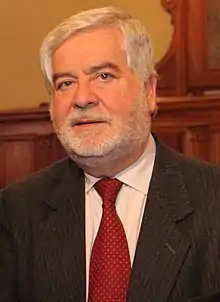Juan Pablo Cárdenas Squella | |
|---|---|
 | |
| Born | 1 December 1949 |
| Education | Pontifical Catholic University of Chile |
| Occupation | Journalist |
| Awards | |
Juan Pablo Cárdenas Squella (born 1 December 1949[1]) is a Chilean journalist and academic who has founded and directed multiple periodicals. He has won numerous awards for his work defending freedom of the press.
Born in Santiago,[1] Cárdenas attended German Lyceum of Santiago and Barros Arana National Boarding School as a child.[2] He studied journalism at Pontifical Catholic University of Chile;[3] his thesis was titled: "The Press and the Peasant Reality."[2] While he was studying there, he began working for the university's magazine, Debate Universitario, which he would later direct;[3] he left that position in 1973.[4] In 1977, he founded the weekly magazine Análisis, which reported on the corruption and human rights abuses of Augusto Pinochet's government. As a result of his work for Análisis, Cárdenas faced physical and legal harassment.[1] He was detained seven times and, in 1987, sentenced to eighteen months of nighttime prison, during which he spent nights imprisoned and continued working during the day.[1] His nightly commute to prison garnered international attention, and he was accompanied by crowds that included colleagues and the media. One night, American playwright Arthur Miller accompanied him.[1] In November 1989, his house was partially burned down by unknown attackers.[1] He continued to direct Análisis until 1991,[4] when it closed due to declining circulation following the restoration of freedom of the press in 1990 by the government of Patricio Aylwin.[1]
In 1992, he founded the magazine Los Tiempos, which he directed until 1993.[4] In 1994, he became press attaché for the Chilean embassy in Mexico,[1][4] a position he held until 1999[4] or February 2000.[1] In September 2000, he became director of the electronic newspaper Primera Línea,[5] managed by La Nación,[6] on the condition that he would be able to do "critical and independent journalism";[5] La Nación was majority-owned by the government of Chile.[7] He published several articles critical of the government,[5] and according to Cárdenas, he had been director "barely fifteen days" before the Secretary General of Government began pressuring him to resign;[6] on 10 January 2001, he was fired at the government's instigation.[5]
Cárdenas taught at Pontifical Catholic University of Chile from 1972 to 1973, at Catholic University of the North from 1974 to 1975, and at ARCIS University in 1990.[2] Since 1991, he has taught at the School of Journalism at the University of Chile, where he belongs to the Academic Senate.[8] During this time, he also taught briefly at the University of Viña del Mar (1993), Pontifical Catholic University of Valparaíso (2002–2004), and University of the Republic (2005).[2] In 2000, he became director of the University Radio of Chile,[2] a position he held for more than eighteen years.[9] He is married with six children.[2]
In 1986, Cárdenas won the Vladimir Herzog Award.[10] In 1987, he won the Golden Pen of Freedom Award for his work for Análisis.[11] In 2000, he was named one of fifty original World Press Freedom Heroes.[12] In 2005, he received Chile's National Prize for Journalism.[9] Cárdenas has also received awards from the Latin American Federation of Journalists, Dutch Association of Journalists, and Latin American Association for Human Rights, among others.[4]
References
- 1 2 3 4 5 6 7 8 9 Reali, David (2010). "Juan Pablo Cárdenas, Chile". International Press Institute. Archived from the original on 12 March 2016. Retrieved 5 March 2022.
- 1 2 3 4 5 6 "JUAN PABLO CARDENAS SQUELLA" (in Spanish). Association of Chileans in Russia. Archived from the original on 4 March 2016. Retrieved 8 March 2022.
- 1 2 "Juan Pablo Cárdenas Squella" (in Spanish). Pontifical Catholic University of Chile. Retrieved 5 March 2022.
- 1 2 3 4 5 6 "Juan Pablo Cardenas Squella" (in Spanish). School of Journalism, Institute of Communication and Image, University of Chile. Retrieved 5 March 2022.
- 1 2 3 4 "Chili - Rapport Annuel 2002" [Chile - Annual Report 2002] (in French). Reporters Without Borders. Archived from the original on 31 October 2007. Retrieved 8 March 2022.
- 1 2 Cárdenas Squella, Juan Pablo (10 January 2001). Equipo Nizkor (ed.). "Declaración de Juan Pablo Cardenas sobre su despido como director del Diario Electrónico Primera Linea" [Declaration of Juan Pablo Cardenas about his dismissal as director of the electronic daily Primera Linea] (in Spanish). Equipo Nizkor and Derechos Human Rights. Retrieved 5 March 2022.
- ↑ "Empresa Periodística Diario La Nación S.A." [Daily Journalistic Business La Nación S.A.]. Cultura Digital UDP (in Spanish). Diego Portales University. Retrieved 8 March 2022.
- ↑ "Juan Pablo Cárdenas Squella" (in Spanish). University of Chile. Retrieved 5 March 2022.
- 1 2 "Juan Pablo Cárdenas" (in Spanish). Pressenza. Retrieved 5 March 2022.
- ↑ "Lista Premiados Vladimir Herzog todas as edições" [List of those awarded Vladimir Herzog all editions] (in Portuguese). Vladimir Herzog Journalism Award for Amnesty and Human Rights. Retrieved 5 March 2022.
- ↑ "Golden Pen of Freedom". World Association of News Publishers. WAN-IFRA. Retrieved 5 March 2022.
- ↑ "IPI Heroes". International Press Institute. Retrieved 5 March 2022.